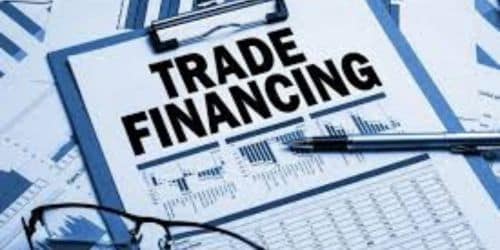Trade financing helps businesses of all sizes reduce risk and enhance supply chain security. When working with overseas suppliers, businesses can be sure they have the financial resources to cover the cost of goods and services. Given the present supply chain disruptions and the quickly shifting global economy, this network of supplier and buyer support is extremely crucial. We’ll go through the fundamentals of trade financing with its solutions and its international company.
What Is Trade Financing
Giving money or credit guarantees to companies doing business internationally is known as trade financing. These companies can fill the financial gap needed to pay for costs like products, transportation, and other associated services for an effective overseas transaction with the aid of trade financing. For parties participating in international commercial transactions, it also offers credit, risk, and fraud prevention. Among the services provided by trade finance are:
- Reducing the hazards of credit, currency exchange, and late payments
- Scheduling letters of credit
- Factoring and discounting of invoices
- Purchasing transactional insurance
Trade finance offers the resources and financial instruments that firms need to manage the risks involved in international trade and reap the rewards of doing business elsewhere.
Why is Trade Finance So Essential?
Most contemporary economies are based on international trade, with trade financing accounting for roughly 80% of all transactions. Both sides run the risk of purchasing or selling items through unreliable or unproven international partners. By facilitating communication and providing evidence to bolster vendor relationships, trade finance helps to lower risks.
Businesses can access a bigger market and take advantage of expansion prospects thanks to trade finance. It enables them to take on more challenging projects and acquire better payment conditions.
These services help parties reduce losses or penalties by making it simpler to deal with the exchange, currency, and tariff concerns that arise during international trade.
How Trade Finance Works
A network of experts who can guide domestic businesses through the complexity of overseas transactions is essential to the success of trade finance. The trade financing market has a large number of participants.
- banks and other lending organizations
- Agents of trade finance
- Exporters and suppliers
- Professionals in export and import
- Insurance businesses
- Export credit institutions
- Agency for shipping and logistics
The Process of Trade Financing
Although the specifics of a trade financing agreement depend on the parties involved, a straightforward trade finance transaction generally goes as follows:
- Negotiate terms – By settling on conditions including documentation needs, payment options, delivery dates, and financial incentives, the vendor and buyer define the deal’s boundaries.
- Apply for financing: In order to finance the transaction, the exporter must apply for a loan from a bank or other financial institution.
- Secure payment – The exporter receives either an advance payment guarantee (APG) from their own bank or an irrevocable letter of credit (LC) from the bank of the importer, which guarantees payment if all requirements are met.
- Fulfill the contract – After obtaining finance, the exporter carries out their contractual obligations and sends the items in accordance with the schedule.
- Collect money – After all, requirements are satisfied, exporters collect money in accordance with the contract via wire transfer or other remittance methods.
Types of Trade Financing
To fulfill the demands of various enterprises and their unique situations, several sorts of financial products and services are available. The most typical types of trade finance are as follows:
#1. Purchase Order Financing
Payments to a company through an intermediary, such as a bank or other financial institution, allow it to pay suppliers in advance. As a result, the danger of trading on credit is diminished. In order to take advantage of economies of scale when purchasing goods or services in bulk, firms can use purchase order financing for bigger transactions and investments as well.
#2. Supply Chain Financing
Gives businesses the ability to pay suppliers earlier and extend payment terms to customers without having an impact on their working capital. Small companies (SMBs) are able to utilize their accounts receivable as security for a line of trade credit. Due to the prompt payment of suppliers, purchasers’ cash flow is enhanced.
Advantages of Trade Financing
Trade finance is a useful tool that safeguards all parties against any financial losses or supply chain disruptions and gives them certainty and peace of mind. Trade financing offers various advantages in addition to logistical support.
#1. Increased Safety
To make sure both sides fulfill their responsibilities, trade finance offers an additional degree of security. If all requirements are completed, exporters can use trade financing to secure funds from their banks as a guarantee of payment.
#2. Decrease in Documentation
Trade financing requires less paperwork than other types of borrowing. Trade finance is typically backed by a variety of collateral, including stocks, assets, or invoices.
#3. Savings on Costs
By enabling companies to avoid expensive loans or transaction fees, trade financing can also help them save money. By taking out a loan, businesses can avoid making significant capital investments for transactions with higher risk.
#4. Quicker Transactions
By providing up-front capital, trade finance dramatically accelerates deals. Trade financing enables exporters to confidently send goods on credit while enabling buyers to make purchases without having to wait for client payment.
#5. Greater Opportunity Access
Trade financing enables companies to reach untapped areas and clientele. They are able to provide appealing terms and payment options to boost sales.
International Trade Financing
The term “international trade finance” refers to the financial assistance provided by banks or other financial institutions to importers and exporters using a variety of financial instruments, such as bank guarantees and letters of credit, to enable them to conduct business without facing financial hardship. By providing financial support and assurance, international trade finance seeks to reduce these risks for all parties involved in international trade. Importers, exporters, banks, trade finance firms, and other parties are involved in international trade financing.
Who Uses International Trade Finance?
Importers, exporters, merchants, producers, manufacturers, etc. are examples of parties who make use of international trade finance.
#1. Who Provides Trade Finance?
For their corporate clients, a number of financial institutions other than banks offer safe and reliable import and export finance services.
#2. Financial Institutions
Companies can get advance money from financial institutions with a valid operating license if they require it for ongoing business transactions.
#3. Financial Intermediaries
In addition to the above financial institutions, a number of financial intermediaries work with financial companies to assist international trade transactions. Examples of these intermediaries include agents and third-party service providers. It is made up of insurance brokers who can point you in the direction of insurance providers.
#4. Traditional Commercial Banks
Small and large domestic and international banks provide businesses all over the world with services related to international trade finance.
How is International Trade Finance Different From Other Financing Options?
There are a few significant distinctions between traditional finance or credit issuance and international trade financing. While broad finance is used to manage solvency or liquidity, financing for international trade may not always be an indication that a buyer is strapped for cash or liquidity.
Instead, the particular risks associated with international trade, such as fluctuating exchange rates, political instability, a party’s creditworthiness, or issues with non-payment, can be protected against using trade finance globally.
Types of International Trade Finance
International trade financing can protect buyers and sellers from the risks of international trade while general funding is frequently used to assure solvency or liquidity. It can be provided in a variety of ways. The many forms of international trade finance are as follows:
#1. Letter of Credit
Assuring the seller that they will swiftly receive the full amount owed in exchange for the goods and services they have provided, a letter of credit is a document that validates the existence of funds and is issued by a financial institution on behalf of the buyer.
#2. Bank Guarantee
International enterprises can get services for international trade finance from domestic or foreign banks of any size.
#3. Factoring
Businesses and organizations can utilize factoring as a financial strategy when they require quick cash. Selling business receivables to a factor, a third party is the practice of factoring. The factor or trade financier pays a reduced price for the exporter’s bills. The business client or consumer pays the full purchase price to the factor.
#4. Export Credit
A guarantee, insurance, or credit known as an export credit allows a foreign buyer of goods or services to defer payment over time. These financial services may be obtained by international businesses through export credit organizations.
#5. Forfaiting
The exporter sells all of their accounts to forfeiture at a discounted price in exchange for cash for all of their accounts. Forfeiting sells exporter receivables without forfeiture.
#6. Insurance
Exporters are vulnerable to cargo loss, product damage, and client nonpayment in international trade.
Trade Financing Company
Banks’ and tech companies’ digital efforts are making trade financing more vital to enterprises. To meet environmental, social, and governance (ESG) targets and opportunities, be it through paperless processes or green financing. Hence, trade financing companies include:
#1. BNP Paribas
BNP Paribas won this year’s Global Best Trade Finance Provider-Bank award thanks to its wide range and depth of trade finance services and solutions. This company has over 350 trade finance professionals operating in 100 trade centers to support clients with their trade finance operations. Thus, BNP Paribas holds a market-leading position in Europe and has a strong presence in the Asia-Pacific region and the Americas.
#2. Finastra
Finastra, our Best Trade Finance Provider-Non-Bank, developed an app solution for managing and handling digital original documents using distributed ledger technology, doing away with the need for a central registry or document repository. This app solution involved integrating Fusion Trade Innovation with Enigio’s trace: original solution. Banks are able to provide traceable documents thanks to the solution. According to both businesses, this might result in an 82% decrease in jobs needing manual intervention and a 91% reduction in processing and administrative expenditures. Additionally, it can reduce the 14-day processing period for a single document to a few hours.
#3. Sberbank
Sberbank’s AI strategy keeps arduous operations streamlined and benefits customers. By developing an online evaluation system that suggests the best trade finance deals to customers, the bank earned the Best Use of Artificial Intelligence in Trade Finance award. The client is immediately asked to complete the form if the system determines that a client and counterparty require an LC.
#4. Shinhan Bank
Due to its continued efforts to leverage digitization to streamline trade finance, South Korea’s Shinhan Bank was named the Most Innovative Bank for Trade Finance. Internally, different trade finance documents are automated using robotic process automation, and Shinhan is utilizing artificial intelligence (AI) for document screening to make sure they adhere to changing worldwide sanction compliance. Shinhan also actively participates in consortiums and pilot projects utilizing a variety of technologies and is always seeking to amplify its efforts to offer solutions for digital trade financing.
#5. Standard Chartered
The first back-to-back LC framework and electronic document display with essDOCS combination, also on Contour, were provided by Standard Chartered Hong Kong in 2021 to win the Best Trade Document Management award. Standard Chartered Hong Kong had already issued the world’s first renminbi-denominated blockchain LC on Contour—a blockchain-based trade platform.
#6. CGI
The Best Trade Finance Software Provider, CGI, recently improved CGI Trade360’s back-office functionality using application programming interfaces to support customers and foster innovation in trade and supply chain finance. Straight-through processing for payables financing is one of them. Others include integrating an eSignature solution into trade finance workflows, incorporating intelligent process automation into the platform, integrating with a digital document platform, utilizing blockchain technology, and introducing new sustainable supply chain finance and sustainability-related loan product offerings.
Trade Financing Solutions
A business can use trade financing solutions to finance trade in a variety of ways. Terms like stock finance, borrowing base finance, and purchase order finance are frequently used. ‘Purchase order’ type trade finance is the primary method of trade financing that is often utilized and easily accessible in the market. When considering a trade financing company, whether domestically or abroad, this is the norm.
Invoice financing is another well-known trade finance option. Even though it’s not exactly trade finance, invoices are utilized to lower the borrower’s overall funding costs. Typically, invoice financing is less expensive than trade financing. As a result, when products are delivered to a final customer, an invoice is generated, and money is typically advanced against it.
Is Trade Finance High Risk?
The use of trade finance is diverse for both importers and exporters. The likelihood of financial crimes involving trading is therefore relatively high.
Do All Banks Offer Trade Finance?
Only banks are used for trade finance.
What Is the Difference Between Trade Financing and a Loan?
Instead of using your credit or the credit of your company, cash is supplied through trade finance based on your current transactions and your customers’ credit.
Related Posts
- LINE OF CREDIT: Best UK Practice And What You Should Know
- TRADE MARKETING: The Best Trading Strategies
- Trade Finance: Overview, Definition, Course, Examples
- HOW TO DAY TRADE: Complete Guide to Day Trading for Beginners






